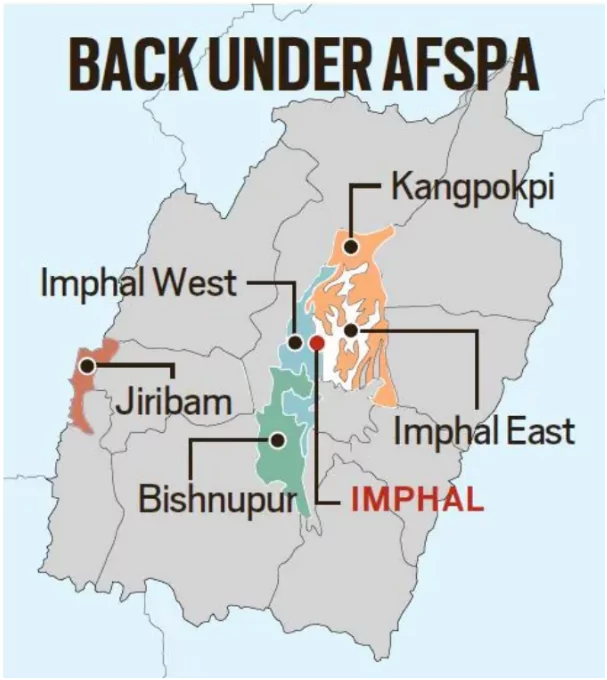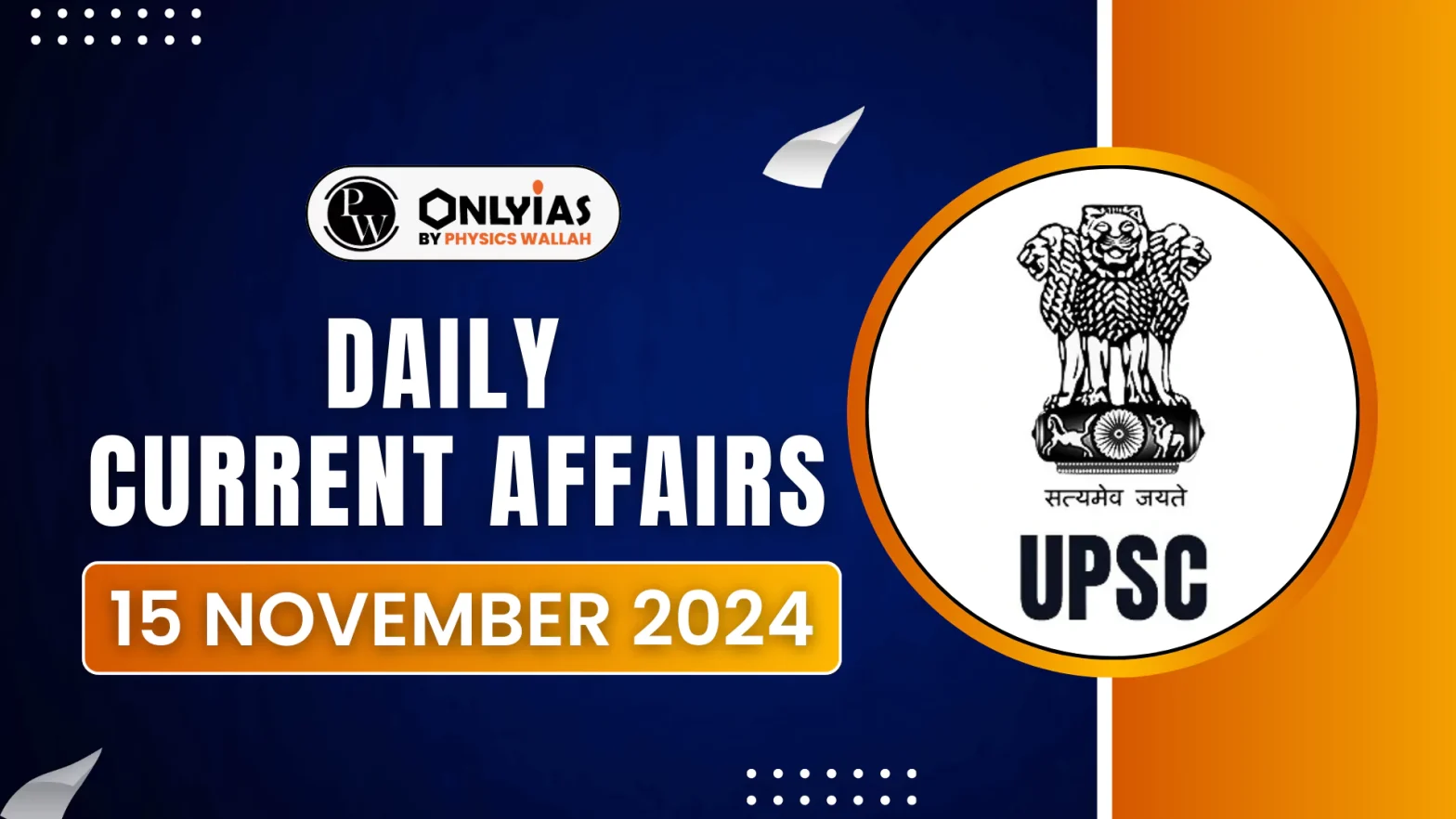A year and a half after the start of ethnic violence in Manipur, the Centre recently reimposed the Disturbed Areas status under the Armed Forces (Special Powers) Act (AFSPA) in the jurisdiction of six police stations.
Background and Current Situation in Manipur

- Reimposition of AFSPA: The Centre reimposed the Disturbed Areas status under AFSPA in six police stations in Manipur’s valley regions due to continued violence.
- Affected Police Stations: Sekmai, Lamsang, Lamlai (Imphal West and East), Moirang (Bishnupur), Leimakhong (Kangpokpi), and Jiribam.
- Reason for Reimposition: Ministry of Home Affairs (MHA) cited a “volatile” security situation and the involvement of insurgent groups in violence.
- Historical Context:
- AFSPA has been enforced in Manipur since 1980.
- Partial withdrawal started in 2004 after protests following the death of Thangjam Manorama.
- AFSPA was rolled back from 19 police stations in valley areas between April 2022 and April 2023.
Enroll now for UPSC Online Course
About Armed Forces Special Powers Act (AFSPA)
- Background:
- The Act in its original form was promulgated by the British in response to the Quit India movement in 1942.
- After Independence, Prime Minister Jawaharlal Nehru decided to retain the Act, which was first brought in as an ordinance and then notified as an Act in 1958.
- AFSPA provides special powers for the armed forces.
- Any commissioned officer, warrant officer, non-commissioned officer or any other person of equivalent rank in the armed forces can be given “special powers” under AFSPA
- Special powers of the armed forces under Section 4
- If deemed necessary to maintain public order, after giving due warning, officers can use force, including firing, even causing death, against anyone violating laws Prohibiting gatherings of five or more people, or carrying weapons, firearms, ammunition, or explosives in the disturbed area.
- If reasonable suspicion exists, Officer can also arrest a person without a warrant Enter or search a premises without a warrant
- Unless otherwise authorised by the central government, Army soldiers operating under the AFSPA are shielded from all legal actions.
- Any person arrested or taken into custody may be handed over to the officer in charge of the nearest police station along with a report detailing the circumstances that led to the arrest.
- It can be imposed by the Centre or the Governor of a state, on the state or parts of it, after it is declared “disturbed’’ under Section 3.
- The Centre can take a decision to repeal AFSPA after getting a recommendation from the state government.
- The Jeevan Reddy Committee was established in 2004 to review the AFSPA and recommended its repeal, suggesting it be replaced by a more humane law that maintains security while addressing human rights concerns.
Disturbed Areas under AFSPA
- A disturbed area is one which is declared by notification under Section 3 of the AFSPA.
- An area can be disturbed due to differences or disputes between members of different religious, racial, language or regional groups or castes or communities.
- The Central Government, or the Governor of the State or administrator of the Union Territory can declare the whole or part of the State or Union Territory as a disturbed area.
- The governor or the Centre can override the opinion of state governments on whether to enforce the Act.
- Disturbed Areas (Special Courts) Act, 1976: Once declared ‘disturbed’, the region is maintained as disturbed for a period of three months straight
- The government of the state can suggest whether the Act is required in the state or not.
Current Situation
- Currently, AFSPA is in effect in parts of Nagaland, Assam, Manipur, and Arunachal Pradesh.
- It was lifted from Tripura in 2015, Meghalaya in 2018 and Mizoram in the 1980s.
- AFSPA remains in force in Jammu and Kashmir through the Armed Forces (Jammu and Kashmir) Special Powers Act, 1990.
Criticism of AFSPA
- Human rights violations: Critics allege that the law has led to human rights violations, such as fake encounters and torture.
- Lack of accountability: The law grants the armed forces sweeping powers and immunity from prosecution without central government approval.
- Militarization of governance: Critics argue that the law contributes to the militarization of governance, undermining democratic principles and civilian authority.
- Centre-state conflicts: The law erodes states’ autonomy, even during peaceful times, creating friction between the Centre and the states.
- Colonial-era law: The law is compared to the Rowlatt Act, which allowed arrests based on suspicion without due process.
- Symbol of oppression: The law has become a symbol of oppression, an object of hate, and an instrument of discrimination.
Check Out UPSC CSE Books From PW Store
Way Forward
- Adherence to Human rights: It needs to be emphasized that human rights compliance and operational effectiveness are not contrarian requirements. In fact, adherence to human rights norms and principles strengthens the counter insurgency capability of a force.
- Removing ambiguity in law: The terms like “disturbed”, “dangerous” and “land forces” need to be clearly defined to ensure greater clarity.
- Ensuring transparency: Greater transparency in communicating the status of existing cases to include its display on the army and government’s websites.
- Independent inquiry: Every death caused by the armed forces in a disturbed area, be it of a common person or a criminal, should be thoroughly enquired into.
- Implementation of Committee Recommendations: The Jeevan Reddy Committee (2004) and the 5th report of the Second Administrative Reforms Commission on public order both recommended the repeal of AFSPA, advocating for a more humane law balancing security and human rights.
![]() 15 Nov 2024
15 Nov 2024

